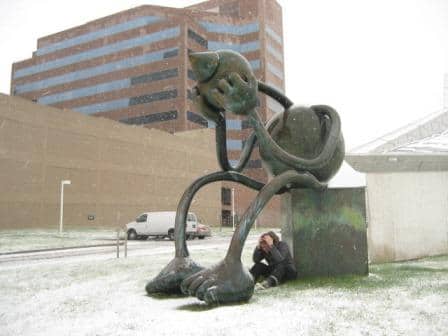If you struggle with painful thoughts then you have probably tried everything you can to get rid of them. And you have probably also discovered it isn’t possible. The good news is you don’t need to get rid of difficult or distressing thoughts to live a fulfilling and purposeful life.
You see your brain is a thought generating machine. In fact research by the National Science Foundation in 2005 found that the average person has between 12,000 & 60,000 thoughts every day. Wow! And they also discovered more than 80% of our thoughts are negative, and 95% are the exact same repetitive thoughts we had yesterday.
So, it seems that it’s actually normal to have critical, harsh, fearful, nasty or really strange thoughts just pop into our minds.
The problem isn’t the thought or story. The problem is getting caught up in it, entertaining it, indulging in it, or losing yourself in it – essentially believing it. In the ACT model of counselling we call this fusing with the thought. Fusion is when your thought and whatever it refers to blend together. For example, you react to the thought, “I can’t cope” as if you actually can’t cope. You believe and react as if your thoughts are real, wise, threatening or important.
THE IMPACT OF PAINFUL THOUGHTS AND FEELINGS
Let’s look at how this is affecting your emotions and behavior:
♦ Your Emotions – When you are fused to a thought it generates related emotions. For example, if you believe “life’s not fair”, you are likely to feel frustrated, angry or sad. If you believe you “can’t cope” then you are likely to experience anxiety, worthlessness or hopelessness.
♦ Your Behavior – There are two ways this is probably affecting your behavior.
1. Trying to distract yourself from the painful thoughts – This could be anything from eating, drinking, exercise, sleeping, watching TV, shopping, work, or social media. The list is endless. And yes most of these actions are okay in themselves. However, they are a problem if you’re doing them to distract yourself from uncomfortable thoughts and emotions.
Here are some questions you can ask yourself. Is this action:
◊ Restricting your life in some way?
◊ Keeping you stuck?
◊ Wasting your time or money?
◊ Impacting on your relationships?
◊ Affecting your health?
◊ Draining your energy?
2. Avoiding situations, people, places or activities you find challenging – Have you quit or withdrawn from activities you used to do, or put things off? You might say to yourself, “I’ll do that later”, but later never comes.
SO, WHAT CAN YOU DO
In ACT the goal is not to try to change or avoid or get rid of the thought or story. The focus is on accepting them. Yes! You heard me right!
Acceptance is giving up the struggle with your thoughts so that you can focus on what really matters to you. In ACT this is called defusion.
Note: This isn’t about liking the thought, approving of it, tolerating it, or even putting up with it. It’s simply acknowledging, “this is a story” or “this is a thought”, and making room for it, instead of getting tangled up in it.
Here are a few of simple defusion techniques suggested by Russ Harris that you can begin today:
♥ Noticing and naming – Lets say you notice a difficult thought like, “I can’t cope with this any more” or “I never get it right”. You can reduce the impact of these thoughts by saying, “I’m having the thought that I can’t cope with this any more”, or “I’m having the thought that I never get it right.” Give this a try with a troubling thought you’ve had. Most likely you’ll notice you feel less emotional reaction or connection to the thought.
♥ Name your stories – Remember 95% of what you think is on repeat. So give your stories a name. And when those story-line thoughts pop-up, say, “Oh, here’s my, I’m incompetent story again”, and let it go.
♥ Thank you mind – If you are having catastrophzing thoughts, like, “I hope I don’t lose my job…there seem to be heaps of businesses closing down lately…”., say, “Thanks mind for looking out for me. But I’m fine, there’s nothing you need to be doing right now”. And bring your focus to whatever you were doing before the thought appeared.
It will take time and practice to learn this new way of managing thoughts, so don’t give up. Remember you have spent years perfecting your present habit of fusing with thoughts. So be patient and really kind to yourself. I have been using defusion techniques for clients and for myself with great success.
Lets Talk
If you need help with painful thoughts and emotions, and especially if you have experienced trauma in your life, please call me for a Free 15 minute consultation. We can talk about what is going on for you and I can answer any questions you might have. If I am with a client I will get back to you as soon as I can.
Lets Talk
If you need help with painful thoughts and emotions, and especially if you have experienced trauma in your life, please call me for a Free 15 minute consultation. We can talk about what is going on for you and I can answer any questions you might have. If I am with a client I will get back to you as soon as I can.
or if you are ready to book now




